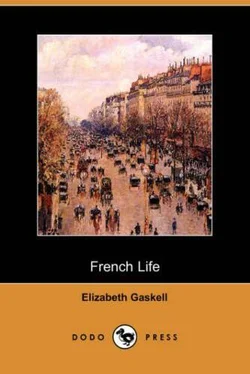French Life
by Elizabeth Gaskell
Paris, February , 1862.
We went to-day along the Boulevard Sévastopol, Rive Gauche, to pay a call. I knew the district well about six years ago, when it was a network of narrow tortuous streets; the houses high, irregular, picturesque, historical, dirty, and unhealthy. I used to have much difficulty in winding my way to certain points in the Quartier Latin from the Faubourg St. Germain, where I was staying. Now, the Hôtel Cluny is enclosed in a neat garden, the railings of which run alongside of the Boulevard Sévastopol; a little further, on the same side to the left, the Sorbonne Church is well exposed to view; and the broad artery of the new Boulevard runs up to the Luxembourg gardens, making a clear passage for air and light through the densely populated quartier . It is a great gain in all material points; a great loss to memory and to that kind of imagination which loves to repeople places. The street in which our friend lived was old and narrow; the trottoir was barely wide enough for one uncrinolined person to walk on; and it was impossible to help being splashed by the passing carriages, which indeed threw dirt upon the walls of the houses till there was a sort of dado of mud all along the street. In the grander streets of former days this narrowness did not signify; the houses were of the kind called entre cour et jardin (of which there are specimens in Piccadilly), with the porter's lodge, the offices, and stables abutting on the street; the grand court intervening between the noise and bustle and the high dwelling-house of the family, which out-topped the low buildings in front. But in the humbler street to which we were bound there were few houses entre cour et jardin ; and I could not help wondering how people bore to live in the perpetual noise, and heavy closeness of atmosphere.
The friend we were going to see, Madame A-, had lived in this street for many years. Her rooms were lofty and tolerably large. The gloomy outlook of the long narrow windows was concealed by the closed muslin curtains, which were of an irreproachable whiteness. I knew the rooms of old. We had to pass through the satle-à-manger to the salon; and from thence we, being intimate friends, went on into her bedroom. The satle-à-manger had an inlaid floor, very slippery, and without a carpet; the requisite chairs and tables were the only furniture. The pile of clean dinner-plates was placed on the top of a china stove; a fire would be lighted in it, half-an-hour before dinner, which would warm the plates as well as the room. The salon was graced with the handsome furniture of thirty or forty years ago; but it was a room to be looked at rather than used. Indeed, the family only sit in it on Sunday evenings, when they receive. The floor was parqueté in this room, but here and there it was covered with small brilliantly-coloured Persian carpets: before the sofa, underneath the central table, and before the fire. There were the regular pieces of furniture which were de rigueur in a French household of respectability when Madame A- was married: the gilt vases of artificial flowers, each under a glass shade; the clock, with a figure of a naked hero, supposed to represent Achilles, leaning on his shield (the face of the clock); and the " guéridon " (round, marble-topped table), which was so long the one indispensable article in a French drawing-room.
But, altogether, Madame A-'s salon does not look very habitable; and we pass on into the bed-room, which has little enough of daylight coming through the high narrow windows, but is bright and home-like from the brilliant blaze and flicker of the wood-fire on the hearth. In the far corner is the bed: a grand four-post, with looped-up draperies of some warm colour, which I dare say would prove to be faded if one were to see them close, in full country daylight; but which look like a pictorial background to the rest of the room. On each side of the fire is a great arm-chair; in front is a really comfortable sofa: not elegant, nor hard, nor gilded like the sofas in the drawing-room, but broad, low, clean, fit to serve, as I dare say it has done before now, for a bed on occasion. Parallel to this, but further from the fire, is a table with Madame's work-box; her two pots of flowers, looking as fresh as if the plants were growing in a country garden; the miniatures of her children, set up on little wooden easels; and her books of devotion.
But Madame reads more than books of devotion. She is up in the best modern literature of more than one country. To-day, we were exceedingly struck with her great powers of narration. She seizes the points of a story and reproduces them in the most effective simple language. She is certainly aided in this by her noble, expressive face, still bearing traces of remarkable beauty in the severe and classical style. Her gesticulation, too, is unlike what we commonly call French; there is no rapid action of the graceful hands and arms, but a gentle and slow movement from time to time, as if they sympathised with the varying expression of her face. She sat by her fire-side, dressed in black, her constant colour; which she wears as appropriate to her age rather than to her condition, for she is not a widow. Every now and then, she addressed a few tender words to an invalid of the family; showing that with all her lively interest in the histories she was telling us, her eye and ear were watchful for the slightest signs of discomfort in another. .
Our conversation drifted along to the old French custom of receiving in bed. It was so highly correct, that the newly-made wife of the Duc de St. Simon went to bed, after the early dinner of those days, in order to receive her wedding-visits. The Duchesse de Maine, of the same date, used to have a bed in the ball-room at Sceaux, and to lie (or half-sit) there, watching the dancers. I asked if there was not some difference in dress between the day- and the night-occupation of the bed. But Madame A- seemed to think there was very little. The custom was put an end to by the Revolution; but one or two great ladies preserved the habit until their death. Madame A- had often seen Madame de Villette receiving in bed; she always wore white gloves, which Madame A- imagined was the only difference between the toilette of day and night. Madame de Villette was the adopted daughter of Voltaire, and, as such, all the daring innovators upon the ancient modes of thought and behaviour came to see her, and pay her their respects. She was also the widow of the Marquis de Villette, and as such she received the homage of the ladies and gentlemen of the ancien régime .
Altogether her weekly receptions must have been very amusing, from Madame A-'s account. The old Marquise lay in bed; around her sat the company; and, as the climax of the visit, she would desire her femme de chambre to hand round the heart of Voltaire, which he had bequeathed to her, and which she preserved in a little golden case. Then she would begin and tell anecdotes about the great man; great to her, and with some justice. For he had been travelling in the South of France, and had stopped to pass the night in a friend's house, where he was very much struck by the deep sadness on the face of a girl of seventeen, one of his friend's daughters; and, on inquiring the cause, he found out that, in order to increase the portions of the others, this young woman was to be sent into a convent — a destination which she extremely disliked. Voltaire saved her from it by adopting her, and promising to give her a dot sufficient to insure her a respectable marriage. She had lived with him for some time at Ferney before she became Marquise de Villette. (You will remember the connexion existing between her husband's family and Madame de Maintenon, as well as with Bolingbroke's second wife.)
Читать дальше












